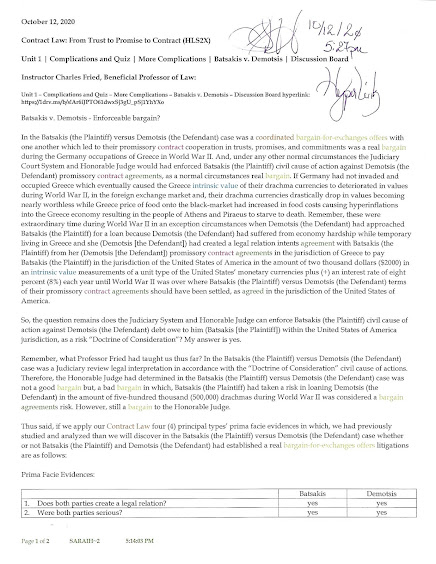Contract Law: From Trust to Promise to Contract (HLS2X) | Unit 1: Complications and Quiz | More Complications | Batsakis v. Demotsis | Discussion Board
Photo by Karsten Winegeart on Unsplash
October 12, 2020
Contract Law: From
Trust to Promise to Contract (HLS2X)
Unit 1 |
Complications and Quiz | More Complications | Batsakis v. Demotsis | Discussion
Board
Instructor Charles Fried, Beneficial
Professor of Law:
Unit 1 – Complications and Quiz – More Complications – Batsakis v. Demotsis – Discussion Board hyperlink: My Batsakis v. Demotsis Discussion Board Hyperlink
Batsakis v. Demotsis - Enforceable bargain?
In the Batsakis (the Plaintiff) versus Demotsis (the Defendant) case was a coordinated bargain-for-exchanges offers with one another which led to their promissory contract cooperation in trusts, promises, and commitments was a real bargain during the Germany occupations of Greece in World War II. And, under any other normal circumstances the Judiciary Court System and Honorable Judge would had enforced Batsakis (the Plaintiff) civil cause of action against Demotsis (the Defendant) promissory contract agreements, as a normal circumstances real bargain. If Germany had not invaded and occupied Greece which eventually caused the Greece intrinsic value of their drachma currencies to deteriorated in values during World War II, in the foreign exchange market and, their drachma currencies drastically drop in values becoming nearly worthless while Greece price of food onto the black-market had increased in food costs causing hyperinflations into the Greece economy resulting in the people of Athens and Piraeus to starve to death. Remember, these were extraordinary time during World War II in an exception circumstances when Demotsis (the Defendant) had approached Batsakis (the Plaintiff) for a loan because Demotsis (the Defendant) had suffered from economy hardship while temporary living in Greece and she (Demotsis [the Defendant]) had created a legal relation intents agreement with Batsakis (the Plaintiff) from her (Demotsis [the Defendant]) promissory contract agreements in the jurisdiction of Greece to pay Batsakis (the Plaintiff) in the jurisdiction of the United States of America in the amount of two thousand dollars ($2000) in an intrinsic value measurements of a unit type of the United States’ monetary currencies plus (+) an interest rate of eight percent (8%) each year until World War II was over where Batsakis (the Plaintiff) versus Demotsis (the Defendant) terms of their promissory contract agreements should have been settled, as agreed in the jurisdiction of the United States of America.
So, the question remains does the Judiciary System and Honorable Judge can enforce Batsakis (the Plaintiff) civil cause of action against Demotsis (the Defendant) debt owe to him (Batsakis [the Plaintiff]) within the United States of America jurisdiction, as a risk “Doctrine of Consideration”? My answer is yes.
Remember, what Professor Fried had taught us thus far? In the Batsakis (the Plaintiff) versus Demotsis (the Defendant) case was a Judiciary review legal interpretation in accordance with the “Doctrine of Consideration” civil cause of actions. Therefore, the Honorable Judge had determined in the Batsakis (the Plaintiff) versus Demotsis (the Defendant) case was not a good bargain but, a bad bargain in which, Batsakis (the Plaintiff) had taken a risk in loaning Demotsis (the Defendant) in the amount of five-hundred thousand (500,000) drachmas during World War II was considered a bargain agreements risk. However, still a bargain to the Honorable Judge.
Thus said, if we apply our Contract Law four (4) principal types’ prima facie evidences in which, we had previously studied and analyzed than we will discover in the Batsakis (the Plaintiff) versus Demotsis (the Defendant) case whether or not Batsakis (the Plaintiff) and Demotsis (the Defendant) had established a real bargain-for-exchanges offers litigations are as follows:
Prima Facie Evidences:
|
|
Batsakis |
Demotsis |
|
1.
Does both parties create a legal relation? |
yes |
yes |
|
2.
Were both parties serious? |
yes |
yes |
|
3.
Were both parties’ bargain-for-exchanges legal and
moral contract? |
yes |
yes |
|
4.
Were both parties offer a Gift or a Bargain? |
bargain |
bargain |



Comments